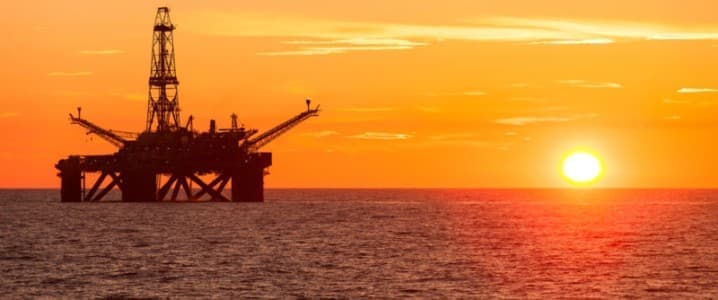Business
Suriname’s Oil Boom Gains Momentum Despite Economic Challenges

Suriname, a small South American nation, is on the brink of realizing a significant oil boom after years of delays and economic turmoil. The government in Paramaribo has been closely observing the successful oil developments in neighboring Guyana, which has emerged as a leading petrostate. Despite positive results from offshore drilling, Suriname faced numerous setbacks, including political instability and economic hardship, raising questions about the timing and impact of its oil exploration.
Political and economic challenges have compounded the situation. President Chandrikapersad Santokhi, who previously held office, was forced out due to the fallout from strict austerity measures imposed under an International Monetary Fund (IMF) program. His successor, Jennifer Geerlings-Simons, now grapples with the dual challenges of a struggling economy and the potential benefits of the oil sector. Suriname has been dealing with a severe financial crisis since the COVID-19 pandemic, further exacerbated by rising living costs that led to public unrest earlier this year.
In February 2023, protests erupted in Paramaribo as citizens reacted to the harsh austerity measures, which included cuts to government spending and the removal of energy subsidies. According to the IMF, about one-fifth of the population lives below the poverty line, highlighting the urgent need for economic recovery. Despite these struggles, the IMF reported in March 2025 that “the objectives of the program have been broadly achieved,” noting that the economy is growing, inflation is decreasing, and public debt is declining.
The path forward remains fraught with challenges. The IMF has emphasized the necessity for Suriname to maintain fiscal discipline and improve its governance structures. Even with the progress made, President Santokhi’s administration faced criticism for its handling of the economic situation, ultimately leading to his removal from office in July 2025. The hopes for Suriname’s economy rest heavily on the burgeoning offshore oil industry, which has been in development since the first significant oil discovery at the Maka Central-1 well in January 2020.
Since that initial find, the country has seen a series of discoveries, culminating in the Krabdagu find in 2022. The oil reserves in Block 58 are estimated to hold around 750 million barrels of light, sweet crude oil, which is attractive for modern energy markets focused on low-emission fuels.
Development plans for these discoveries have faced delays, particularly from TotalEnergies, which postponed its final investment decision (FID) due to inconsistent exploration results and concerns over the gas-to-oil ratio in the reservoir. In October 2024, TotalEnergies, in partnership with APA Corporation, announced a $10.5 billion investment to develop the Sapakara and Krabdagu fields, with production expected to begin in 2028.
The GranMorgu project, located approximately 93 miles offshore from Paramaribo, aims to produce 220,000 barrels of oil and 450 million cubic feet of natural gas daily. This development is designed with a capacity for 2.1 million barrels of storage and promises a low carbon intensity, aligning with global efforts to reduce greenhouse gas emissions. TotalEnergies has committed to an all-electric Floating Production Storage and Offloading (FPSO) vessel, ensuring minimal environmental impact during operations.
The economic implications for Suriname are substantial. The national oil company, Staatsolie, holds a 20% interest in the GranMorgu project, valued at around $2.4 billion, which could significantly increase national revenue. Projections indicate that the oilfield could generate between $16 billion and $26 billion over its operational life, a figure that far exceeds Suriname’s current GDP of $4.46 billion.
As Suriname navigates its path toward economic revitalization through oil production, the government must balance environmental responsibilities with the urgent need for fiscal stability. The combination of potential oil revenues and necessary reforms could provide a crucial lifeline for this economically troubled nation, but the journey remains complex and fraught with challenges.
-

 Politics4 weeks ago
Politics4 weeks agoSecwepemc First Nation Seeks Aboriginal Title Over Kamloops Area
-

 World5 months ago
World5 months agoScientists Unearth Ancient Antarctic Ice to Unlock Climate Secrets
-

 Entertainment5 months ago
Entertainment5 months agoTrump and McCormick to Announce $70 Billion Energy Investments
-

 Science5 months ago
Science5 months agoFour Astronauts Return to Earth After International Space Station Mission
-

 Lifestyle5 months ago
Lifestyle5 months agoTransLink Launches Food Truck Program to Boost Revenue in Vancouver
-

 Technology3 months ago
Technology3 months agoApple Notes Enhances Functionality with Markdown Support in macOS 26
-

 Lifestyle3 months ago
Lifestyle3 months agoManitoba’s Burger Champion Shines Again Amid Dining Innovations
-

 Top Stories2 months ago
Top Stories2 months agoUrgent Update: Fatal Crash on Highway 99 Claims Life of Pitt Meadows Man
-

 Politics4 months ago
Politics4 months agoUkrainian Tennis Star Elina Svitolina Faces Death Threats Online
-

 Sports5 months ago
Sports5 months agoSearch Underway for Missing Hunter Amid Hokkaido Bear Emergency
-

 Politics5 months ago
Politics5 months agoCarney Engages First Nations Leaders at Development Law Summit
-

 Technology5 months ago
Technology5 months agoFrosthaven Launches Early Access on July 31, 2025





















